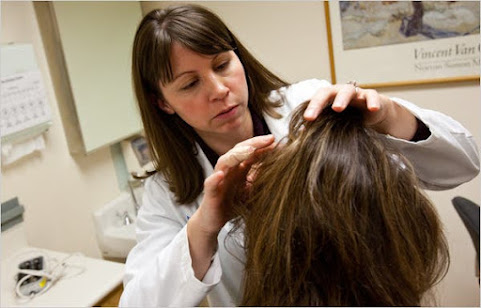Can a Dermatologist Help With Hair Loss?
Hair loss can be a distressing experience, affecting not just your appearance but also your confidence. Whether it’s thinning strands, receding hairlines, or patchy bald spots, the emotional toll can be significant. If you’re in the UAE and grappling with this issue, consulting the Best Dermatologist in Dubai could be a game-changer. But can a dermatologist truly help with hair loss? Let’s dive into how these skin and hair experts can address your concerns, explore treatment options, and guide you toward healthier, fuller hair.
Understanding Hair Loss: Why It Happens
Before seeking professional help, it’s essential to understand why hair loss occurs. Hair loss, medically known as alopecia, can stem from various causes:
Genetics: Androgenetic alopecia, or pattern baldness, is the most common cause, affecting both men and women.
Hormonal Changes: Pregnancy, menopause, or conditions like polycystic ovary syndrome (PCOS) can trigger hair thinning.
Medical Conditions: Thyroid disorders, autoimmune diseases like alopecia areata, or scalp infections can lead to hair loss.
Lifestyle Factors: Stress, poor nutrition, or excessive use of harsh hair products can weaken hair follicles.
Medications: Certain drugs, like those for cancer or depression, may cause temporary hair shedding.
A dermatologist is uniquely qualified to pinpoint the root cause of your hair loss, offering personalized solutions based on a thorough diagnosis.
How Can a Dermatologist Help?
Dermatologists are medical doctors specializing in skin, hair, and nails. Their expertise extends far beyond treating acne or eczema—they’re also hair loss specialists. Here’s how they can help:
1. Accurate Diagnosis
Hair loss isn’t a one-size-fits-all condition. A dermatologist will conduct a detailed evaluation, which may include:
Medical History Review: Understanding your health, lifestyle, and family history.
Scalp Examination: Checking for inflammation, scaling, or infection.
Blood Tests: Identifying deficiencies (like iron or vitamin D) or hormonal imbalances.
Scalp Biopsy: In rare cases, a small sample may be taken to rule out specific conditions.
This comprehensive approach ensures the treatment targets the exact cause, whether it’s genetic, hormonal, or environmental.
2. Personalized Treatment Plans
Once the cause is identified, a dermatologist will tailor a treatment plan to suit your needs. Common treatments include:
Topical Medications: Minoxidil, a clinically proven solution, is often prescribed to stimulate hair growth.
Oral Medications: Finasteride may be recommended for men to slow hair loss caused by genetics.
Corticosteroids: For autoimmune conditions like alopecia areata, injections or topical steroids can reduce inflammation.
Platelet-Rich Plasma (PRP) Therapy: This innovative treatment uses your blood’s growth factors to rejuvenate hair follicles.
Laser Therapy: Low-level laser devices can enhance hair density by stimulating follicles.
3. Guidance on Lifestyle Changes
Dermatologists don’t just prescribe treatments—they educate you on lifestyle adjustments to support hair health. This may include:
Nutrition Advice: Incorporating protein, biotin, and zinc-rich foods to strengthen hair.
Stress Management: Techniques like meditation to reduce cortisol levels, which can exacerbate hair loss.
Hair Care Tips: Avoiding tight hairstyles or chemical treatments that damage follicles.
4. Long-Term Monitoring
Hair regrowth takes time, often months. A dermatologist will monitor your progress, adjusting treatments as needed to ensure optimal results. Regular follow-ups help address any side effects and keep you motivated.
Why See a Dermatologist Instead of a General Doctor?
While a general practitioner can offer basic advice, dermatologists have specialized training in hair and scalp disorders. They stay updated on the latest research and technologies, ensuring you receive cutting-edge care. Plus, their ability to perform advanced procedures like PRP or scalp biopsies sets them apart.
When Should You Consult a Dermatologist?
If you notice any of these signs, it’s time to book an appointment:
Sudden or excessive hair shedding.
Bald patches or a widening part line.
Itchy, flaky, or red scalp accompanying hair loss.
Thinning hair that doesn’t improve with over-the-counter products.
Early intervention is key. The sooner you address hair loss, the better your chances of reversing or managing it effectively.
What to Expect During Your Visit
Visiting a dermatologist for hair loss is straightforward but thorough. Here’s what typically happens:
Consultation: You’ll discuss your symptoms, medical history, and concerns.
Examination: The dermatologist will inspect your scalp and hair closely.
Testing: If needed, blood tests or other diagnostics will be ordered.
Treatment Plan: You’ll receive a customized plan with clear instructions.
Follow-Up: A schedule for check-ins will be set to track progress.
Be open about your symptoms and expectations—this helps the dermatologist craft the best approach for you.
Debunking Myths About Hair Loss
Hair loss is surrounded by myths that can cause confusion. Let’s set the record straight:
Myth: Only men experience hair loss.
Truth: Women are equally prone, especially due to hormonal changes or stress.Myth: Wearing hats causes baldness.
Truth: Hats don’t affect hair follicles unless they’re excessively tight.Myth: Hair loss is always permanent.
Truth: Many types, like stress-induced or nutritional hair loss, are reversible with proper treatment.
A Dermatologist Dubai can help you separate fact from fiction, ensuring you focus on effective solutions.
Boosting Confidence Through Professional Care
Hair loss isn’t just a physical issue—it can impact your self-esteem and mental well-being. By consulting a dermatologist, you’re taking a proactive step toward reclaiming your confidence. With their expertise, you’ll not only address hair loss but also gain a deeper understanding of your overall health.
Final Thoughts: Take the First Step Today
If hair loss is weighing you down, don’t wait to seek help. A dermatologist can offer hope, science-backed treatments, and a clear path to healthier hair. Whether you’re dealing with mild thinning or significant hair loss, their expertise can make all the difference. Book a consultation today and start your journey toward a fuller, more confident you.

.jpg)

.jpg)
.jpg)
Comments
Post a Comment